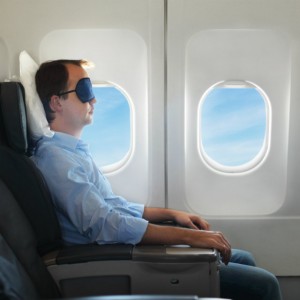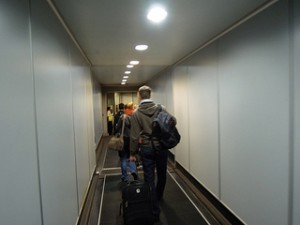Jetlag. It’s a travel reality we can all relate to—you get off a flight in a completely different time zone exhausted, sore and grumpy and all you want to do is go to bed. Instead, you’re committed to a full day of business meetings or jumping into a power-packed vacation. No one likes feeling jetlagged when they travel, but it’s sort of inevitable…right? Wrong! Whether you’ve crossed one time zone or several, here is our best advice for beating the clock before it beats you.
Build a Strong Foundation
 Many experts believe a strong immune system is one of the best ways to beat jetlag. Because our immune systems are our natural line of defense against illness, it’s important to make an even more concentrated effort to practice healthy habits at least two weeks before your trip. Exercising, eating healthy foods, limiting your alcohol intake, reducing your stress levels and getting plenty of sleep are just a few things you can do to boost your immune system. Recent medical research also suggests that eating food with probiotics can help maintain a strong immune system. However, since the FDA not regulate probiotics supplements, stick to probiotic-rich foods, such as yogurt, kefir, miso, tempeh and sauerkraut. Want more immunity-boosting tips? Check out SparkPeople’s 10 Tips to Boost Your Immune System.
Many experts believe a strong immune system is one of the best ways to beat jetlag. Because our immune systems are our natural line of defense against illness, it’s important to make an even more concentrated effort to practice healthy habits at least two weeks before your trip. Exercising, eating healthy foods, limiting your alcohol intake, reducing your stress levels and getting plenty of sleep are just a few things you can do to boost your immune system. Recent medical research also suggests that eating food with probiotics can help maintain a strong immune system. However, since the FDA not regulate probiotics supplements, stick to probiotic-rich foods, such as yogurt, kefir, miso, tempeh and sauerkraut. Want more immunity-boosting tips? Check out SparkPeople’s 10 Tips to Boost Your Immune System.
Acclimate Slowly
Resetting your body clock before you fly is a great way to ease the transition across time zones. Three to four days before your trip, shift your bedtime by an hour or two in the right direction. If you’re traveling west to east, get up and go to bed earlier and if you’re traveling east to west, do the opposite. You can also try shifting your meal times. For example, if you’re heading to San Diego from Boston, try eating an hour or two earlier each day.
Did you know? There’s an app for that! There are actually several smartphone apps that have been developed to help travelers fight jet lag—enter your flight details and they’ll create a suggested schedule of when to sleep and eat to prepare for the time change. Check out 5 Apps to Help You Beat Jetlag.
Set Your Watch
 Many business travelers like wearing two watches—one set to the current time and one set to the time back home—this helps you stay in touch with what’s happening back at the office. Right when you get on the plane, set one of your watches to your destination’s time and behave like you would if you were already there. If it is daytime where you’re headed, try to stay awake. If it’s nighttime, then settle down for some shuteye. Neck pillows, eye masks, earplugs, noise-cancelling headphones, toys and books to keep the kiddos occupied—anything you need to make sleep happen, bring it…and use it! In addition to noise, food and light, temperature is another cue your body uses to set its internal clock. So grab a blanket and crank that up that A/C—a lower temperature lowers your body’s core temperature and signals it’s time for sleep.
Many business travelers like wearing two watches—one set to the current time and one set to the time back home—this helps you stay in touch with what’s happening back at the office. Right when you get on the plane, set one of your watches to your destination’s time and behave like you would if you were already there. If it is daytime where you’re headed, try to stay awake. If it’s nighttime, then settle down for some shuteye. Neck pillows, eye masks, earplugs, noise-cancelling headphones, toys and books to keep the kiddos occupied—anything you need to make sleep happen, bring it…and use it! In addition to noise, food and light, temperature is another cue your body uses to set its internal clock. So grab a blanket and crank that up that A/C—a lower temperature lowers your body’s core temperature and signals it’s time for sleep.
Choose the Best Seat
Speaking of sleep, if you want to sleep on the plane, try to book a roomier seat. SeatGuru.com provides seat maps for over 700 aircrafts by airline name. It tells you which seats have more legroom, as well as which seats to avoid because they don’t recline, are narrower than usual and so forth. And while not all airline seats are created equal, it’s safe to say that if you can advance through the cabin ranks, your body will thank you. Check out SeatGuru’s seat comparison charts to see which airlines offer flat-bed or angle lie-flat seats. This may be well worth the upgrade, especially for long-haul flights.
Drink Lots of Water
Dehydration is one of the symptoms of jet lag, and the dry, cabin air on the plane doesn’t help. One of the biggest mistakes we can make is to count on the small cups of water intermittently handed out by flight attendants. Instead, aim to drink about 6-8 ounces of water each hour you’re awake. That may sound like a lot, but if you’re drinking frequently, you’ll be forced to get up and use the bathroom, thus stretching and moving around. Carry your own water bottle with you and ask the flight attendant to fill it when they serve meals or snacks. Also, avoid consuming alcohol (which is a depressant) and other diuretics such as caffeinated coffees, sodas and teas.
Consider Melatonin
![4568203319_3d2ee84f1d[1]](https://blog.oncallinternational.com/wp-content/uploads/2013/09/4568203319_3d2ee84f1d1-300x200.jpg) Melatonin, a natural hormone also sold as an over-the-counter supplement, is known to help nudge your body toward sleep. Some studies have shown that using melatonin reduces jet lag on both eastward and westward flights, but results vary from person to person. Sleep experts generally recommend taking melatonin after dark the day you travel and after dark for a few days after arriving at your destination. If you’re flying eastward, consider taking melatonin in the evening a few days before you fly.
Melatonin, a natural hormone also sold as an over-the-counter supplement, is known to help nudge your body toward sleep. Some studies have shown that using melatonin reduces jet lag on both eastward and westward flights, but results vary from person to person. Sleep experts generally recommend taking melatonin after dark the day you travel and after dark for a few days after arriving at your destination. If you’re flying eastward, consider taking melatonin in the evening a few days before you fly.
Few caveats: Before taking melatonin, ask your doctor if it’s right for you—it may be contraindicated with certain medications and it’s also not approved by the FDA. Also, if you do take melatonin, think about taking a cab to your hotel and picking up a rental car at the hotel rather than the airport. You may be too drowsy to drive.
Watch What You Eat
First things first, you may want to avoid airline food since it’s served onboard according to your departure city’s time zone. Eating it can sabotage your efforts to reset your clock to your destination’s time zone. Instead, try packing healthy snacks in your carry-on like apples, dried fruit, nuts, carrot sticks and protein bars. You could even consider packing sandwiches that don’t easily spoil. Grab some nut butter and 100% whole grain bread, or try a low-sodium turkey breast (nitrite-free is always a great choice) on whole grain bread with your favorite mustard. Tip: adding mustard, hummus or low-fat mayo in between turkey slices will prevent soggy bread.
General rule of thumb: eat high-protein foods to stay awake and eat more carbohydrates when you’re preparing for sleep.
Fly a Day Early
 If possible, arrive at your destination early to give your body a chance to become accustomed to the new time. If you’ll be traveling across several time zones, plan to arrive a day or two in advance. This is highly-recommended for business travelers who are expected to be focused and alert at meetings and conferences. For example, if your meeting is on Monday, see if you can arrange for a flight on Saturday afternoon. Your employer may be willing to cover the extra night’s hotel bill since you’ll probably be a lot more productive on Monday.
If possible, arrive at your destination early to give your body a chance to become accustomed to the new time. If you’ll be traveling across several time zones, plan to arrive a day or two in advance. This is highly-recommended for business travelers who are expected to be focused and alert at meetings and conferences. For example, if your meeting is on Monday, see if you can arrange for a flight on Saturday afternoon. Your employer may be willing to cover the extra night’s hotel bill since you’ll probably be a lot more productive on Monday.
Do you have any other jetlag prevention tips you’d like to share? Let us know in the comments below!
Safe Travels!
Photo Credits
Jogging from Ed Yardon
Melatonin from Michael Rueter
Boarding a Flight from David McKelvey


